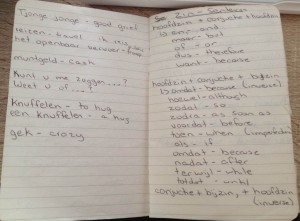Lets not be so simple…with our sentences! Posted by Karoly Molina on Mar 5, 2015 in Dutch Grammar, Dutch Vocabulary
When learning a language, we can sometimes be our worst enemies. We strive for perfection and yet miss a homework assignment or two (or gasp! class), we want to talk about more than the weather and colors but we don’t learn new words. For adults, our enemy is sometimes our intelligence. I don’t mean to sound presumptuous in saying I am so smart, but talking in simple sentences irritates me. I want to say more because I can think of more complex things than my vocabulary allows.
Learning new vocabulary is a great way to improve how we express ourselves. I like to prepare myself ahead of time when I think of an interesting topic by looking up words beforehand (like in the post about shopping).
Another great way to improve our expression of thoughts and ideas is via complex sentences. We don’t always think in basic sentence structure subject + werkwoord in persoonsvorm + rest.
Conjuncties Part I
The most basic group of conjuncties are en, maar, want en dus.
These are simple to use because both parts of the sentence (before and after the conjunction) are hoofdzinnen or independent clauses and maintain their regular Nederlands word order.
Ik wil naar het restaurant gaan en ik wil een tosti eten.
Vandag had ik les maar morgern kan ik thuis blijven.
Ik heb dit boek gekocht maar ik ken de schrijver niet.
Ik ben moe want ik had veel werk te doen dus ik ga vroeger naar bed.
Conjuncties Part II
The second group of conjunctions are tricky because they require you to use a bijzin. For the part that is the bijzin or the subordinate clause, you must throw the verb to the end of the sentence. These little tricksters are als, omdat, zodra, zodat, terwijl, hoewel, nadat, toen and voordat.
Ik zal vlaai kopen als je morgen komt.
Ik wil niet naar de bioscoop gaan omdat de film al is begonnen.
Mijn moeder zal naar hier komen zodra haar vakantie begint.
Ik zal sneller eten zodat we vroeger naar Amsterdam kunnen gaan.
Ik maak broodjes terwijl je doucht.
Ik zal naar jullie gaan hoewel ik hoofdpijn heb.
Ik was de kleren nadat jullie sporten.
Let op!
The bijzin isn’t always the second part of the sentence! It could very well be at the beginning of the sentence forcing the hoofdzin to do inversie (verb + subject).
Hoewel ik hoofdpijn heb, zal ik naar jullie gaan.
Als je morgen komt, koop ik vlaai.
Tips and Notebooks
At first, I had a VERY hard time remembering all of these conjunctions. I always carry in my purse a small notebook in case I get ideas or need to write something down. Part of this notebook is dedicated to Dutch words and expressions. Writing the words down already helps me remember the word better, but knowing I can consult my notebook at anytime gives me peace of mind. Perhaps doing this can be useful for you!

Build vocabulary, practice pronunciation, and more with Transparent Language Online. Available anytime, anywhere, on any device.
About the Author: Karoly Molina
Since I was a little girl, I was fascinated with languages and writing. I speak English, Spanish, Italian, Dutch and a little bit of French. I am a writer, reader, language teacher, traveler, and a food lover! I now live in The Netherlands with my husband Riccardo, our cat Mona, and our dog Lisa, and the experience has been phenomenal. The Dutch culture is an exciting sometimes topsy-turvy world that I am happily exploring!




